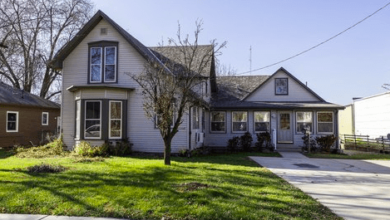Decline in First-Time Home Buyers: Understanding the 2024 Housing Market Shift

The housing market has undergone significant transformations in recent years, and 2024 is no exception. This article explores the causes behind the decline in first-time home buyers, its implications on the real estate market, and what potential buyers and policymakers can do to address this shift.
1. Introduction to First-Time Home Buyers and Market Trends
The dream of homeownership has long been an essential milestone. However, recent economic and market changes have led to a noticeable decline in first-time home buyers. Understanding the reasons behind this trend is essential, not just for buyers but also for economists, real estate professionals, and policymakers working to ensure affordable housing for all.
See also: How Can a Room Divider Curtain or Fence Privacy Screen Improve Your Space?
2. 2024 Decline in First-Time Home Buyers at a Glance
In 2024, first-time home buyers have dropped to a historic low, affected by rising property costs, limited supply, and financial hurdles. This reduction reflects shifts in affordability, economic volatility, and changing priorities among younger generations.
3. Key Factors Contributing to the Decline
Rising Housing Prices
Housing prices have increased significantly, with many areas experiencing double-digit percentage increases in the past few years. Higher property values mean larger down payments and higher monthly mortgage costs, making homeownership challenging for new buyers.
Higher Mortgage Rates
The cost of borrowing has also risen. Mortgage rates are significantly higher than they were just a few years ago, making monthly payments steeper and long-term home costs prohibitive for some first-time buyers.
Wage Stagnation
Despite inflation, wage growth has not kept pace, leading to a decline in real purchasing power. For many potential buyers, stagnant wages make it difficult to save for a down payment or qualify for a mortgage.
Increased Cost of Living
Rising costs of essentials like food, healthcare, and transportation have stretched budgets thin. Many would-be home buyers find themselves prioritizing immediate needs over long-term goals like homeownership.
4. Generational Shifts in Homeownership Aspirations
Millennials and Generation Z, who represent most of today’s first-time home buyers, are rethinking traditional goals, with many prioritizing experiences and flexibility over owning property. This shift, driven by lifestyle changes and economic challenges, has affected the demand for homeownership among younger adults.
5. Impact of Student Debt and Financial Barriers
Student loan debt has reached unprecedented levels, affecting young adults’ ability to save or qualify for mortgages. High monthly loan payments and debt-to-income ratios make it harder for borrowers to secure financing.
6. Changes in Mortgage Requirements
Mortgage lenders have tightened their lending requirements to mitigate risk, often requiring larger down payments and stricter credit evaluations. These standards, while aimed at financial security, create additional obstacles for first-time home buyers.
7. Urbanization and the Cost of City Living
As urban living becomes more attractive, housing costs in cities have skyrocketed. First-time home buyers seeking employment opportunities in metropolitan areas are often priced out, leading some to either delay homeownership or opt for less expensive, remote areas.
8. Impact of Inflation on Housing Affordability
Inflation has a significant impact on housing costs. As inflation raises the costs of goods and services, developers pass on these costs, leading to higher property prices. First-time buyers, especially, feel the pinch, as their budgets are stretched thin to meet both household and housing expenses.
9. How Economic Instability Affects Home Buying Decisions
Economic uncertainty affects consumer confidence, with potential buyers often hesitating to make long-term investments in real estate. In uncertain economic climates, first-time buyers may choose to delay their purchase to maintain financial stability.
10. Consequences of the Decline for the Real Estate Market
The drop in first-time home buyers can impact the broader housing market. With fewer new buyers, properties may stay on the market longer, slowing down turnover rates and potentially leading to price adjustments. This shift can influence property valuations and affect the economy.
11. Government Programs and Initiatives to Assist First-Time Buyers
Several government programs aim to make homeownership more accessible, from grants and tax breaks to down payment assistance programs. However, the effectiveness of these programs depends on awareness and eligibility criteria, which can sometimes be restrictive.
12. Tips for Aspiring Home Buyers in 2024
For those still aspiring to purchase their first home in 2024, here are some practical steps:
- Save Aggressively: Set realistic savings goals and explore high-yield savings accounts.
- Consider Remote Work Locations: Look into cities or regions with more affordable housing and consider remote work opportunities.
- Build Credit: Strengthening credit scores can improve loan eligibility and potentially lower interest rates.
- Explore First-Time Buyer Programs: Research local, state, and federal programs offering financial assistance or tax incentives.
- Work with a Financial Planner: A professional can help tailor a plan to budget, save, and ultimately purchase a home.
13. Conclusion: Looking Forward in the Housing Market
The decline in first-time home buyers reflects a complex web of economic, social, and generational factors that are reshaping the housing landscape. As the market and economy evolve, potential buyers, lenders, and policymakers will need to work together to create sustainable pathways to homeownership. While challenges are abundant, understanding and addressing these barriers is the first step towards a balanced housing market that benefits everyone.
14. Frequently Asked Questions (FAQs)
Q1. Why are first-time home buyers declining in 2024?
The decline is mainly due to high housing prices, increased mortgage rates, wage stagnation, and rising costs of living.
Q2. How do mortgage rates affect first-time home buyers?
Higher mortgage rates increase the cost of monthly payments, making it more challenging for buyers to afford homes within their budget.
Q3. What role does student debt play in homeownership?
Student debt affects buyers’ financial health and debt-to-income ratio, limiting their ability to qualify for loans and save for down payments.
Q4. Are there programs available to help first-time buyers?
Yes, various programs provide down payment assistance, tax incentives, and loan options, although eligibility varies by location and income level.
Q5. Will housing prices decrease to make homes more affordable?
While a drop in housing prices could happen in certain areas, sustained high demand and inflation pressures may limit widespread decreases in the near future.
Q6. How can first-time buyers improve their chances of buying a home?
By saving consistently, exploring affordable locations, improving credit scores, and utilizing available government assistance, buyers can better prepare for homeownership.



